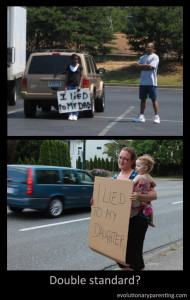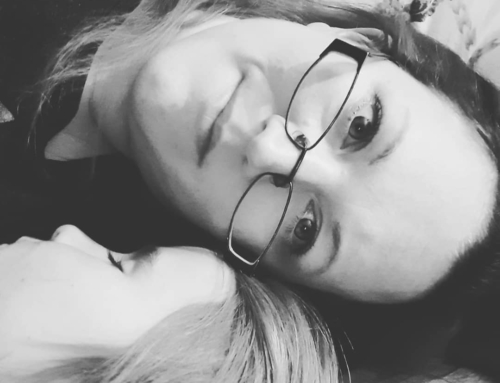 I was at the doctor’s office the other day when I read yet another article in the waiting room on when to lie to your kids. I honestly feel like we’re hitting an epidemic of considering lying as a totally appropriate thing to do not only in our everyday lives but to the children we are entrusted with raising as honest and respectful individuals. We lie to them then we get angry when our kids turn around and lie to us because “lying is wrong” and “things will always be better for them if they tell the truth”. What are kids to believe? How are they to differentiate the different degrees of lying or when lying is bad versus okay, like mom and dad do it?
I was at the doctor’s office the other day when I read yet another article in the waiting room on when to lie to your kids. I honestly feel like we’re hitting an epidemic of considering lying as a totally appropriate thing to do not only in our everyday lives but to the children we are entrusted with raising as honest and respectful individuals. We lie to them then we get angry when our kids turn around and lie to us because “lying is wrong” and “things will always be better for them if they tell the truth”. What are kids to believe? How are they to differentiate the different degrees of lying or when lying is bad versus okay, like mom and dad do it?
I think the problem we have is that the truth has become unacceptable for various reasons and so we justify the use of lies when in reality, our understanding of what constitutes “truth” and our ability to handle negative information is the real culprit and what needs to be addressed. In that vein, if you think that lying to your children is to be encouraged or even just okay, I ask that you consider the following and see how it is possible to not lie to our kids and still be good parents and good citizens.
Telling the truth does NOT mean saying whatever is on your mind
For some odd reason people have decided that telling the truth means being as harsh and rude as you can be and saying whatever comes to mind whenever it comes to mind. That is not the truth – that’s being an ass. If your child brings you a painting of a cat you need not say, “What a horrible piece of work – that looks nothing like a cat!” and you also don’t need to say, “That’s the best cat ever!” It is possible to find something about it that you like and focus your response on that.
Parents often praise effort in these cases (“Wow – I see you worked really hard on that!”) or find something they like about it (“I really like the colours you used for this painting!”) or even improvement (“You must be practicing because I think this cat is better than your last cat!”). We can also do this with our friends and the other people around us because, yes, our kids are paying attention to what we do and say to others as well.
Modeling the ability to be honest while tactful is both a lost art and something that can be essential to doing well in life. Think of a boss who can give instruction or criticize (which comes from the word “critique” and is something we all do – it need not be inherently negative) without being rude or mean, the people working for such a person are likely to be happier and work harder because of it. Similarly, learning how to take this type of input (negative yet not mean) is also essential for our children to survive. We hear of kids who can’t handle even the slightest bit of negative input and we wonder how they’ll handle the world out there; although it’s not our job to create a negative environment for our kids, it is our job to help them learn and grow from mistakes or simply from the start and being kind and honest is essential to that.
I should add that I realize how hard this can be. Most of us were raised with the view that politeness is the equivalent to telling people what they want to hear and so we not only do this to others but expect the same in return. Sadly that’s not really what being polite is. I consider politeness along the same lines as respectfulness and neither of those include being lied to. Is this not why we give lip service to the idea of telling the truth to our children? Why we read them Pinocchio to instill the lesson of telling the truth? As hard as this is to practice, it can be equally hard to accept but in the end we’ll be much healthier if we can abide by it.
Age-appropriate truth is STILL the truth
Many of us are faced with questions from our kids that we just don’t necessarily know how to answer without giving too many details. Take, for example, my own dear daughter who asked the other day what “mating” means while we read one of her big books on bugs which talked about how after mating, the male ant and bee dies. Now, many who advocate lying would tell some story about storks or something like that. For me, I saw the fact that my daughter was asking as a sign she’s ready for some information, but was I going to graphically describe sex? No. I don’t think that would be age-appropriate for a four-year-old. Instead I spoke about how to make a baby, we need a part from mom, the egg, and a part from dad, the sperm (yes, I used that word) and mating is when those two parts are put together. ‘How’ was the part that she didn’t need to know at this age, and she didn’t ask. That answer was sufficient for her (although she did ask if the male dying after mating happened in humans).
The problem many of us face is that we may not have an age-appropriate answer ready at the moment they ask. We’re taken a little aback by whatever the question is – often to do with sex, death, or other “adult” topics. If you face this, you still don’t need to lie. The first option is to just wait a moment and see if you can come up with something in that moment. If not, tell your child you will answer their question but you need some time to think about how to answer it and remember to tell them the answer later. Letting it slide and not answering is NOT being truthful – it’s avoidance and you may find your child not coming to you anymore with their questions (which is not a good thing). The final option if you feel the topic really is too advanced and you can think of no way to safely answer it is to tell them that; tell them it’s a grown up thing that you can explain when they are older. Now, I don’t like this final option much because I think any time a child is ready with a question, their brain is ready for some sort of age-appropriate answer and I also believe there is always an age-appropriate answer. However, I prefer it to lying so it’s here as an option and it’s one you may use regularly to start until you adjust to thinking in age-appropriate ways.
It can be hard to learn how to tell the truth in an age-appropriate way not only because we’re often out of practice, but because it’s hard to inhibit the knowledge we have to think about how to explain it to someone more naive than us (in psychology it’s referred to the “curse of knowledge”). However, helping our children learn about the world – the good and the bad – means explaining things to them as they encounter them and answering their questions in ways they understand. In this way, their knowledge builds in a healthy and developmentally-appropriate manner.
Lying is NOT a substitute for teaching respect
This is somewhat similar to the point about telling the truth in a nice way, but this deals with the concern many parents seem to voice that if one child is told the truth about something culturally sanctioned, they will run around sharing it with all the other children which is, in their minds, unacceptable. This is often raised as a concern when people admit they don’t “do” Santa or the Toothfairy or any of the usual childhood stories with their kids. Whenever the topic is brought up, people somehow assume that one child not doing Santa means they will run around and tell other kids it’s not true and that’s somehow the most horrible thing ever (really!).
In short, the message is: Lie to your kid instead of just teaching them about different beliefs and behaving respectfully.
This one mind-boggles me because we live in such a diverse and multi-cultural world (that is much “smaller” for our kids than it was even for us), yet we assume that parents can’t or won’t teach their children about the differences in thoughts, customs, and beliefs that others have and how to navigate it. Perhaps it’s because so few do actually teach this (and why we see such intolerance) but that should be the focus of the problem, not parents who don’t do the same thing you do.
Parenting involves teaching your child that not everyone will have the same views, that perhaps there are no absolutes, and that it’s okay that others believe and think differently. Regarding those parents who aren’t doing the Santa thing, I’ve never met a parent who actively encouraged their child to tell others Santa isn’t real, but perhaps they exist and I ask you to please treat cultural traditions as you would religious (i.e., with respect).
I do think parents’ fear about hearing Santa isn’t real from other kids comes from our own experiences with the kids who figured it out first and decided to share. We have to ask, though, is that behaviour so surprising? I mean, if you figured it out and realized all your friends were operating under a delusion of sorts, wouldn’t you adamantly tell them? Or if you felt it meant you were “smarter” or cleverer, would you not try to show off? With Santa being treated as an issue of fact instead of belief (think religion), the door to this type of behaviour is wide open.
So I ask parents this: If your child’s belief in Santa is so important to you, you need to either (a) lie to them even more so that any naysayers don’t penetrate the shield of lies you’ve started; (b) keep them away from any other child that might have a different perspective; or perhaps the easiest and least controversial of all, (c) reframe your Santa bit as a belief instead of fact so that you can approach the same discussion around Santa as you would religion, leaving all kids to have their own beliefs and your child to enjoy theirs as long as it works for them. (Oh, and when it framed as a belief, it becomes a lot easier not to blatantly lie to your children as well.)
I know it’s hard to think of reframing something so ingrained, but if you really are that fearful of what others will tell your kids (and to this I ask, do your kids not have friends who follow a different religion that also negates this cultural tradition?), then you need to look at how you have explained it to your child. If you leave no wiggle room for them to comprehend their belief in the face of conflicting beliefs then you have set up a situation where you have to care what others do or say, and how is that helpful at all to your parenting journey or your child’s experience?
***
Although lying has become a normative part of not only society but parenting as well, I think we need to start trying to reverse this trend. If we want our children to grow up to be able to handle criticism, deal with people honestly and respectfully, and perhaps most of all, be honest and open with us parents, we need to set the stage and model the behaviours we’re looking for. Teaching them about the world honestly is important for their growth and intellect. Teaching them how to interact with others with respect and kindness, even in the face of giving bad news, is key to their ability to interact with others throughout their life. And finally, teaching them that people share different beliefs – even about something as treasured as Santa – will allow them to approach others that differ in beliefs with kindness and respect. Lying is not a good parenting tool and there’s no reason we should need to rely upon it or even encourage it.






I love this! I’ve been thinking a lot about the Santa thing lately because a new mom and I wasn’t sure how to handle it. I definitely don’t want to lie to my kids so this gives me a lot of confidence to do what I feel is right. I’m curious how you’ve fielded questions from your daughter on the topic. Is christmas still a magical,wonderful time for her (if you even celebrate)? Has she told other kids he’s not real? Have you gotten grief from other parents? I’m so curious how this plays out in real life experiences if you’re willing to share!